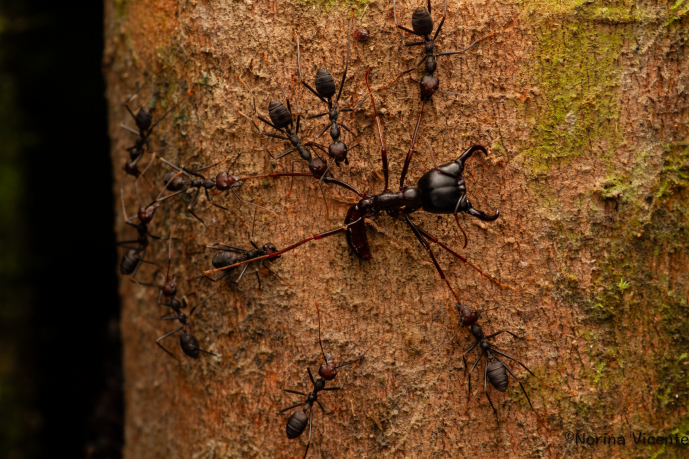KEYANTS: Understanding the role of Dorylus driver ants as keystone species in Afrotropical Rainforests
Though their ecological importance to African rainforests is enormous, driver ants (Dorylus sp.) are among the most poorly understood ecosystem engineers on Earth. Dorylus colonies can contain more than twenty million individuals and swarm across each square meter of the forest floor every few weeks. Dorylus are considered the most important tropical insectivore, as their swarms create massive fronts of fleeing arthropods that provide a bounty for primates, pangolins, and specialized ant-following birds. By understanding the ecology of ecosystem engineers (Dorylus) and their dependents (birds), we can develop strategies for designing sustainable landscapes that mitigate the effects of deforestation and habitat degradation. This project focuses on the ecology of Dorylus driver ants and their role in Afrotropical rainforest ecosystems. Specifically, it aims to contribute to the understanding of Dorylus ant colonies, encompassing their spatial and temporal dynamics, sensitivity to disturbances and temperature shifts, area coverage, and colony density within forest patches. Coupled with studies on the ecology of the many bird species reliant on the ants, including GPS home range tracking, this research enables parameterizing a realistic agent-based model illustrating the movements of both Dorylus ants and their dependent birds in space. Simulations of realistic scenarios of deforestation and forest degradation will allow to predict how this ant-bird system responds to these drivers. Ultimately, the project seeks to design functional landscapes that support perhaps the most important ecosystem engineers in Afrotropical rainforests.
The project is part of the Gulf of Guinea Research Program, which promotes biodiversity research, conservation and sustainable use in the region.
The project is part of the Gulf of Guinea Research Program, which promotes biodiversity research, conservation and sustainable use in the region.
Team
Principal Investigator

Maximillian PTG Tercel
Position: Auxiliary Researcher
Group:
RAINFORESTS Students
State
Ongoing
Proponent Institution
CIBIO - InBIO
Funded by
TROPIBIO, University of Montpellier
Dates
2024 (Duration: 3 years)


